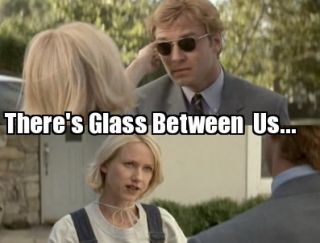
Attention
Is Technology Driven Distraction Good? Do We Want More?
Google Glass is coming for your humanity. Resistance is futile.
Posted February 20, 2013
The behemoth Google, major stakeholder in your online life, wants ownership of your off-line life as well. Here is the promo for their upcoming Google Glass project, which, quite honestly, creeps me out. Essentially, the product is a pair of glasses that ensures that the internet will never be more than a blink away.
There are a number of psychological angles to take on this. Are the conditions under which we evolved so dissimilar from a world of total connectivity that we'll find ourselves unable to adapt? Will our relationships hold up with the omnipresent distraction of the world wide web? The wonderful 2004 comedy I Heart Huckabees got to this territory first:

I don't mean to be a technophobe. But I think there is a great deal of wisdom in keeping our attention largely focused on what is in front of our own noses. Now, when what is on top of our noses happens to be an infinite stream of information and entertainment, I fear a bit about our collective ability to maintain awareness of our actual, in the flesh environment and relationships.
Already many folks have a tendency to become lost in the giant "series of tubes" that make up the internet. Plugging in can function in a variety of ways, and differs widely from person to person. For some, plugging in can be a valuable tool to learn, engage, and to interact. For others, it can be used to avoid and to check out. For most of us, it serves both functions alternately, depending on what we're up to.
There is no denying the seductive power of infinite information. It's so seductive, in fact, that many of us choose to engage in it, even when it is unsafe and there is the potential for major consequences. According to the Governor's Highway Safety Association, drivers distracted by their wireless devices are disproportionately likely to be in an accident. If we can't even keep ourselves from being distracted when participating in an inherently dangerous activity such as driving, what hope do we have when our experience is filtered through a personal internet windshield?
At its worst, mobile technology can enable us to easily participate in our most troublesome tendencies. It provides a nearly perfect avoidance mechanism. Are you having a stressful day at work? Angry Birds. Are you in a conflict with your partner? Stupidinternetmemes(dot)com.
We have very good reason to believe that this avoidance of unpleasant experience, known as experiential avoidance, is highly correlated with psychopathology. When we withdraw from uncomfortable experiences, you could say that we begin a process of organizing our lives around them. By allowing stressful, emotional experiences such as conflict or worry to drive us to avoidant behaviors, we are in effect making them into the central organizing principle of our lives.
Wireless devices can function in this manner. When we can easily obtain a reliable experience of relief or of distraction, we'll often choose to disengage from the stressful, yet often highly meaningful, circumstances of our lives. Once we do it one time, and learn that it brings a desirable consequence, we're highly likely to do it again, and again, and again.
If the power of virtual "connectivity" is in front of our faces, all of the time, I wonder what will happen to human connectivity.
I can't help thinking about the Borg, The Matrix, and the Terminator. Time for me to visit stupidinternetmemes(dot)com.
Copyright 2013 Nathan W. Gates

